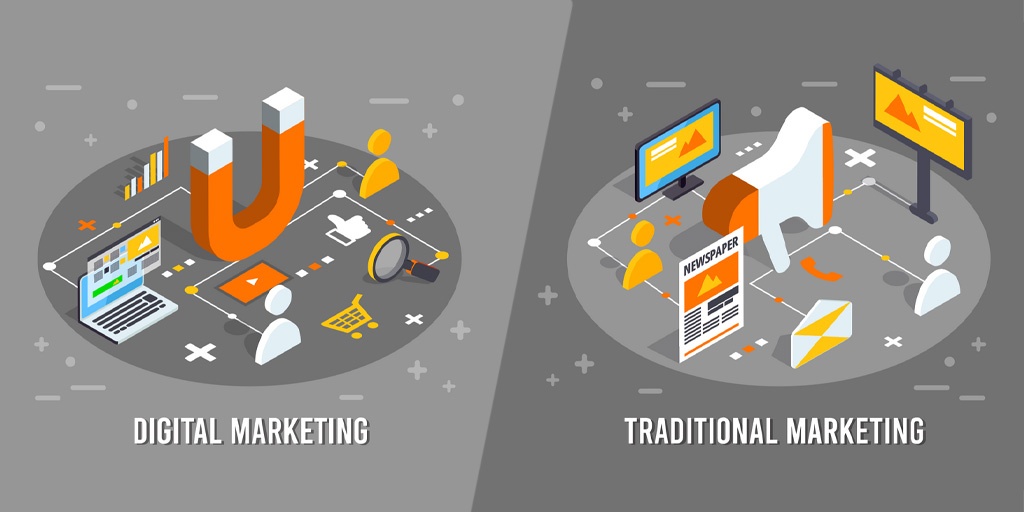How Does Digital Marketing Differ from Traditional Marketing?

In the age of digital transformation, companies are discovering that traditional marketing still provides significant value in extending market reach. But, can traditional marketing compete with digital marketing? Furthermore, is traditional marketing as budget-friendly and effective in targeting an audience?
Businesses that choose between digital and traditional formats often do so based on their budget, their business goals and their current internal processes. So, which is better? How does digital marketing differ from traditional marketing? Let’s take a closer look.
What is Traditional Marketing?
Traditional marketing is a broad term that refers to conventional methods for promoting a product or service. Some common forms of traditional marketing include:
Print encompasses almost any form of hard-copy marketing collateral such as brochures, magazines, newsletters, newspapers, flyers, business cards or inserts. Companies mass distribute print to reach as many people as possible.
Broadcast
Broadcast includes on-screen or televised advertising. Companies can promote their products through product placement (in movies or shows), sponsorships, commercials, long-form infomercials, movie theater ads or radio ads.
Direct Mail
Direct mail is still a popular form of advertising because it allows companies to target an individual directly. Direct mail may include catalogs, letters, brochures, postcards, fliers or anything that a company can print and send through the mail.
Telemarketing
Although telemarketers may be highly unpopular, telemarketing still works as a viable form of product promotion. Using requested calling or cold calling, a person speaks directly with an individual over the phone.
Pros and Cons of Traditional Marketing
There are some benefits and drawbacks to traditional marketing such as:
Pros
- Traditional marketing is difficult to ignore.
- It’s easier to plan, design and create marketing collateral in-house.
- Companies have greater control over messaging and branding.
- Traditional marketing still resonates with certain audiences.
- Marketers can target specific audiences through direct mail or broadcast.
Cons
- Compared to digital marketing, traditional marketing is more expensive.
- It is difficult to analyze the success of traditional marketing tactics.
- A project can take longer to plan and execute.
- Digital marketing is a better option for segmentation when targeting an audience.
- Traditional marketing is gradually becoming more obsolete.
What is Digital Marketing?
Digital marketing is a broad term that refers to using electronic devices or online platforms to promote a product or service. Some common forms of digital marketing include:
Website Design and Development
The most powerful form of digital marketing is website design. Companies often use their website as a digital storefront, creating a brand, promoting products, educating their audience and updating readers with the latest news and information.
Social Media
Social media platforms such as LinkedIn, Facebook, Twitter or Instagram allow companies to engage with audiences more directly. Marketers can post photos, videos, content and graphics on their self-created social media page.
Messaging
Messaging may include instant messenger services, email, text messages or in-app messages. Companies can send almost any type of message they want: new offers, discounts, updates, incentives – whatever attracts their audience.
Videos
Through platforms such as YouTube, Vimeo and other streaming services, companies now utilize videos to promote their products and services. Videos continue to grow in popularity because they are easy to make, easy to post online and provide instant stimulation for an already media-driven culture.
Pros and Cons of Digital Marketing
There are some benefits and drawbacks to digital marketing including:
Pros
- You can plan and execute a digital marketing strategy with minimal cost.
- Digital marketing is easy to track, monitor and analyze.
- You can utilize the same strategy on multiple digital channels with little adjustment.
- Digital platforms allow you to engage directly with your audience.
- The potential marketing reach is much greater with digital marketing.
Cons
- Digital marketing can be time-consuming and requires additional planning.
- Companies are more vulnerable to negative feedback and reputation damage.
- Digital platforms are more vulnerable to technical problems.
- Cybersecurity threats are always imminent on digital platforms.
Digital Marketing vs Traditional Marketing: Which is Best for You
Before you decide which type of marketing is best for your company, you may want to embrace a more unified approach to both digital and traditional marketing. In other words, both can work in your favor depending on your marketing goals.
For instance, if you are at a business conference, brochures or flyers may be your most powerful marketing tool. If you want to double your market reach over the next 60 days, then emailing or social media may be a better option. A mailout might be good if you are trying to attract a certain demographic. If you want to pinpoint analysis on how well your campaign is performing, then using multiple digital marketing channels provides measurable data.
Complete Traditional and Digital Marketing for Your Business
At Lucid, we provide a wide range of marketing tools that help you expand your market reach while targeting the customers you want. We deliver measured results that reflect your brand and help you reach your goals. To find out more about our services, call us at 850.760.0478 or fill out the quick contact form below, and we will be in touch.
Request a Site Audit
We’ll perform a free analysis of your website for common technical SEO issues and optimization best practices.
